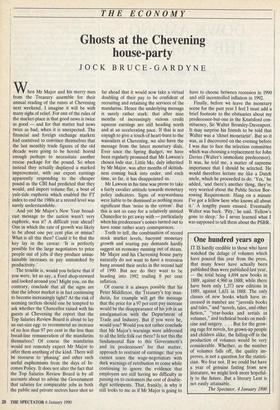THE ECONOMY
Ghosts at the Chevening house-party
JOCK BRUCE-GARDYNE
When Mr Major and his merry men from the Treasury assemble for their annual reading of the runes at Chevening next weekend, I imagine it will be with many sighs of relief. For one of the rules of the market-place is that good news is twice as good — and for that matter bad news twice as bad, when it is unexpected. The financial and foreign exchange markets had contrived to convince themselves that the last monthly trade figures of the old decade were going to be horrid: horrid enough perhaps to necessitate another rescue package for the pound. So when instead they actually displayed a marked improvement, with our export earnings apparently responding to the cheaper pound as the CBI had predicted that they would, and import volume flat, a bout of yule-tide euphoria which enabled the FT index to end the 1980s at a record level was surely understandable.
And yet Mr Major's New Year broad- cast message to the nation wasn't very euphoric, was it? A difficult year ahead? One in which the rate of growth was likely to be about one per cent plus or minus? What is all this then? Could it be that the key lay in the caveat: `It is perfectly possible for the large negotiators to price people out of jobs if they produce unsus- tainable increases in pay unmatched by productivity.'
The trouble is, would you believe that if you were, let us say, a Ford shop-steward and looked around you? Might you, on the contrary, conclude that all the signs are that the labour market is in fact continuing to become increasingly tight? At the risk of seeming tactless should one be tempted to ask whether the Chancellor raised with his guests at Chevening the report that the Top Salaries Review Board is about to lay an out-size egg: to recommend an increase of no less than 97 per cent in the less than bread-line remuneration of the mandarins themselves? Of course the mandarins would not remotely expect Mr Major to offer them anything of the kind. There will be recourse to 'phasing' and other such useful euphemisms from the days of In- comes Policy. It does not alter the fact that the Top Salaries Review Board is by all accounts about to advise the Government that salaries for comparable jobs in both the public and private sectors have shot so far ahead that it would now take a virtual doubling of their pay to be confident of recruiting and retaining the services of the mandarins. Hence the underlying message is surely rather stark: that after nine months of increasingly vicious credit squeeze earnings are still heading north and at an accelerating pace. If that is not enough to give a touch of heart-burn to the wassailers at Chevening, we also have the message from the latest monetary dials. Ever since the Spring Budget, we have been regularly promised that Mr Lawson's chosen lode star, Little Mo, duly inherited by Mr Major, was after months of skittish- ness coming back into order, and each time, so far, it has disappointed us.
Mr Lawson in his time was prone to take a fairly cavalier attitude towards monetary policy indicators. Signs of waywardness were liable to be dismissed as nothing more significant than 'noise in the system'. But this is not so easy for a relatively untried Chancellor to get away with — particularly when his predecessor's noises turned out to have some rather scary consequences.
Truth to tell, the combination of record stock market levels, buoyant monetary growth and soaring pay demands hardly suggest an economy running out of steam. Mr Major and his Chevening house party naturally do not want to have a recession hung around their necks in the second half of 1990. But nor do they want to be heading into 1992 trailing 8 per cent inflation.
Of course it is always possible that Sir Peter Middleton, the Treasury's top man- darin, for example will get the message that the price for a 97 per cent pay increase would be the disappearance of his job in an amalgamation with the Department of Trade and Industry. But if you were he, would you? Would you not rather conclude that Mr Major's warnings were addressed to all the little folk out there? Is not this the fundamental flaw to this Government's and its predecessors' for that matter, approach to restraint of earnings: that you cannot scare the wage-negotiators with dark warnings of retribution to come while continuing to ignore the evidence that employers are still having no difficulty in passing on to customers the cost of double- digit settlements. That, frankly, is why it still looks to me as if Mr Major is going to have to choose between recession in 1990 and still incontrolled inflation in 1992.
Finally, before we leave the monetary scene for the past year I feel I must add a brief footnote to the obituaries about my predecessor-but-one in the Knutsford con- stituency, Sir Walter Bromley-Davenport. It may surprise his friends to be told that Walter was a 'closet monetarist'. But so it was, as I discovered on the evening before I was due to face the selection committee which was choosing a replacement for John Davies (Walter's immediate predecessor). It was, he told me, a matter of supreme importance that I should be selected. He would therefore lecture me like a Dutch uncle, which he proceeded to do. 'Yes,' he added, 'and there's another thing, they're very worried about the Public Sector Bor- rowing Requirement. Hang on a minute I've got a fellow here who knows all about it.' A lengthy pause ensued. Eventually Walter was back. 'Pity,' he said. 'Fellow's gone to sleep.' So I never learned what I was supposed to tell them about the PSBR.










































 Previous page
Previous page